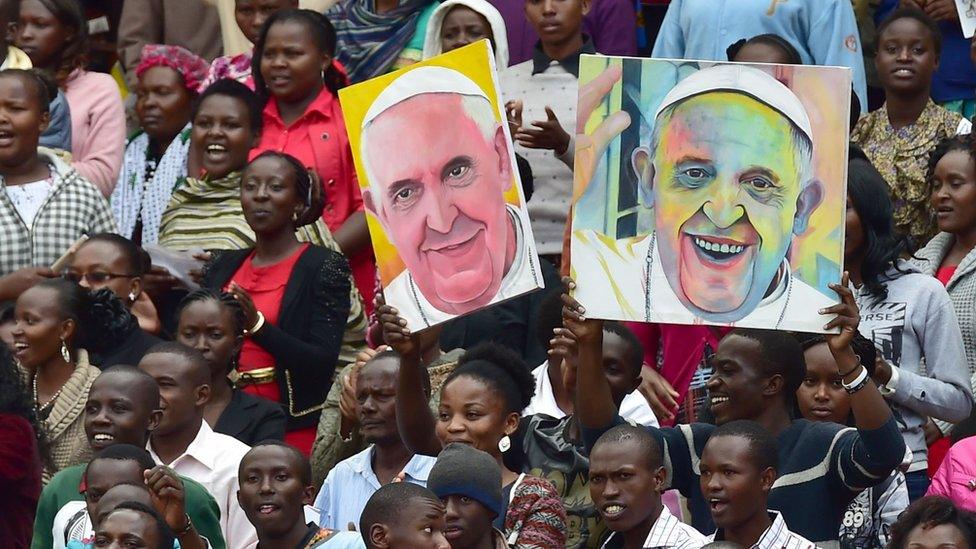Letter from Africa: The Catholic continent?
- Published

In our series of letters from African journalists, film-maker and columnist Farai Sevenzo considers Africa's relationships with the Pope.
As Pope Francis jetted into Nairobi, Kampala and Bangui we were all reminded of the startling figures - Catholicism is growing fastest on the African continent - from 45 million in 1970 to 176 million in 2012.
The African churches are fuller and because the commitment to the priesthood in Europe has dwindled, churches in the West are seeing more African priests conducting Mass across European villages and towns.
Back in 2012 as the previous pontiff, Benedict XVI, was preparing to stand down, Kenya's Daily Nation newspaper ran the headline: "Wanted: A Pope from Africa."
The newspaper observed: "Will there ever be a time when leadership will be entrusted to an African Pope? The world last had an African Pope over 1,500 years ago. There have only been three, and they were not that 'black.'"
The Daily Nation was referring to Pope Gelasius I, who died on 19 November 496 AD, and is recorded as having been born in "Roman Africa", which could be anywhere in current North Africa.
'Rock and roll papacy'
Three years ago it had been Catholic Africa's fervent hope that Nigeria's Cardinal Francis Arinze, the most senior African in the College of Cardinals, would lead his growing flock in Africa and beyond.
But African Catholics have welcomed the age of Francis, grateful over the last week to lap up a bit of the rock and roll papacy - for the Pope proved popular with presidents and lepers and showed an ingenious capacity to do the simple things well.
He preached peace and love, as his job demands, and he urged Africa's young to look to their faith in what is becoming a bloody century.
Highlights from Pope Francis' first visit to Africa
Somewhere near Kampala he prayed for 50 men and women martyred 50 years ago when a Ugandan king, worried by the spread of Christianity, killed the converts.
Some may have even have offered prayers for the thousands killed across the continent many decades before for refusing to convert.
Over in the Central African Republic, where only two years ago Muslims and Christians were tearing themselves apart for power and control, Pope Francis landed on a runway in Bangui that had been turned into a sprawling camp for thousands of displaced Christians.
The world at large was worried about his safety.

The Pope in Africa:

There was great excitement for the Pope's visit in all three countries

The UN says the conflict in CAR has taken the lives of 6,000 people so far, and the presence of tanks and soldiers went hand-in-hand with altar boys, as acting President Catherine Samba-Panza asked him for "forgiveness" for the country's recent religious violence.
Pope Francis told the gathered faithful to foster unity by avoiding "the temptation of fear of others, of the unfamiliar, of what is not part of our ethnic group, our political views or our religious confession".
He visited a mosque and shared holy thoughts of peace and brotherhood with an imam.
We cannot of course confuse the messenger with the man - or woman - upstairs in whatever heaven we believe in, but even a rock star pontiff will have recognised that the continent has its own set of problems in need of urgent attention.
Africa has its share of Catholic presidents, who cling to their ethnic origins narrowly avoiding international sanctions - and who have forgotten the much-mentioned humility of their Pope.

Farai Sevenzo:

"Women... yearn for larger roles in the running of the Church, even as lay preachers"

Moreover, the changing face of Africa and the challenges the continent faces can be seen in her ever youthful population.
The young have been dying from jihadist bombs in universities, kidnapped by militants in remote villages and risking death in dangerous boats to cross the Mediterranean in search of opportunity.
Hot topics eschewed
Since the men with their bibles arrived on African shores one and a half centuries ago, Africans themselves have never been able to quite leave their own ways. Animism and Catholicism have often resided in the same households
Yet the Catholic Church has been seen as more tolerant than the modern evangelist churches with their young, snappily dressed prophets.
And where they could do nothing for your spirit, the Catholic priests gave you an education.
But that history must now tally with the present.
Catholic Africa - in 60 seconds
The family, the bedrock of Catholic stability, is changing too.
African families are being split apart by natural social changes and women in many instances are the heads of their families.
They also remain the largest proportion of Catholic congregations, and yearn for larger roles in the running of the Church, even as lay preachers.
Then there is the Church's attitude to sex and sexuality - on a continent still at loggerheads over the rights of homosexuals and contraception; in an age where Aids continues to walk amongst the living and the graveyards, the rock star pontiff mentioned neither of these pressing issues.
So while the Pope may not be as "black" as some would wish, his brief African visit to three countries will have given spiritual tonic to some and done incumbent presidents no harm.
But he still faces the task of dragging his African flock into the 21st Century - along with the Church.

More from Farai Sevenzo:
